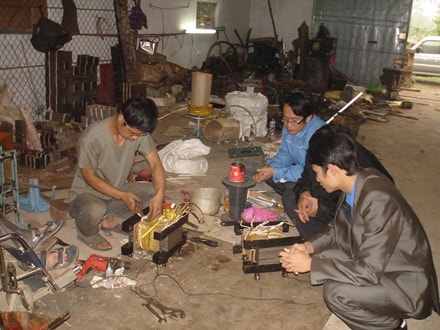Need to expand vocational training according to business orders
(Baonghean) -Nghe An is currently encouraging vocational training establishments to follow orders from businesses. This is a form of training based on the address, close to the needs of society, ensuring benefits for schools, vocational training establishments, workers and businesses...
In recent years, vocational training and job introduction for rural youth have been implemented very effectively by Thanh Chuong District Youth Union. The District Youth Union Executive Committee has innovated by coordinating with the district vocational training center to organize vocational training according to the needs of enterprises. Over the past 4 years, 20 industrial sewing classes and 8 welding classes have been opened, introducing stable jobs for 1,850 youth union members. Typically, the coordination with Vinh Cat Company Limited is in charge of labor export consulting; coordination with Song Hong Garment Corporation (Nam Dinh) to develop vocational training programs and introduce jobs for youth union members. Accordingly, the trainees who have completed the training are given stable jobs at the company. In addition, the District Youth Union also coordinates with the Central Fruit and Vegetable Institute to build a model of economic development for youth and misting nozzles in Thanh Nho commune, Youth Volunteer Team 2, and Youth Volunteer Team 5.


Learn civil electricity and tailoring
Mr. Trinh Van Nha - Secretary of Thanh Chuong District Youth Union said: The biggest difficulty for rural youth today is still the problem of career and employment. Therefore, surveying and coordinating with businesses in vocational training both meets the needs of businesses and creates output for young workers after training.
At Nghi Loc District Vocational College, before each course, based on the criteria that businesses give the school such as the number and capacity of workers in each profession, the school compiles orders from businesses and plans to enroll the correct and sufficient number of students. “Training in this form is beneficial for all three parties. The school does not have to worry about the output for the students, and the enterprises also create favorable conditions for students to have a place to practice their skills. As for the enterprises, they have placed orders in advance, so the school's training program is close to the actual work of the enterprises. After graduating, students working at the enterprises are no longer confused or have to go for retraining. They can only focus on their studies because they have a stable output. In particular, with this form, the school has created jobs for many workers whose land was recovered in Nghi Long, Nghi Thuan, Nghi Xa, Nghi Tien, Nghi Thiet communes. Students not only acquire basic, scientific and advanced knowledge of farming techniques, but their labor productivity is also much higher,” said Mr. Pham Xuan Hong, the school's principal.
Currently, Nghi Loc Vocational College is training many different professions. After graduating from any course, 100% of students find stable jobs with high incomes such as welding and mechanical engineering with an average salary of 3-3.5 million VND/month.
According to statistics, there have been more than 100 orders from corporations, groups, and enterprises to train over 2,500 rural workers in Nghe An province in occupations such as industrial sewing, welding, civil electricity, rattan and bamboo weaving, fine art carpentry, wood carving, crocheting, and brocade weaving. After completing the course, the rate of employed workers is over 80% and the stable income is over 1.5 million VND/month. The expansion of training levels, diversification of vocational training forms and training industry structure has made the scale of vocational training increase rapidly; the vocational training speed of Nghe An province in 2011 is expected to increase by 4%. The quality and effectiveness of vocational training by location have been improved through the skill level of apprentices and the ability of students to access jobs after graduation. Vocational training has been associated with job creation, self-employment, contributing to the shift of agricultural labor structure to industrial labor. After learning a trade and improving their skills, many farmers have invested in expanding their production scale according to farm models such as aquaculture, flower growing, raising pigs and chickens for meat, etc., contributing to creating jobs for local children.
However, to expand and develop this form of training, the province needs to have specific incentive policies for businesses inside and outside the province to attract workers after training. Because in reality, there are still few industrial parks in the province, attracting local workers is still limited, so most of the workers after training have to go to work far away but the economic efficiency is not great...
Khanh Ly
